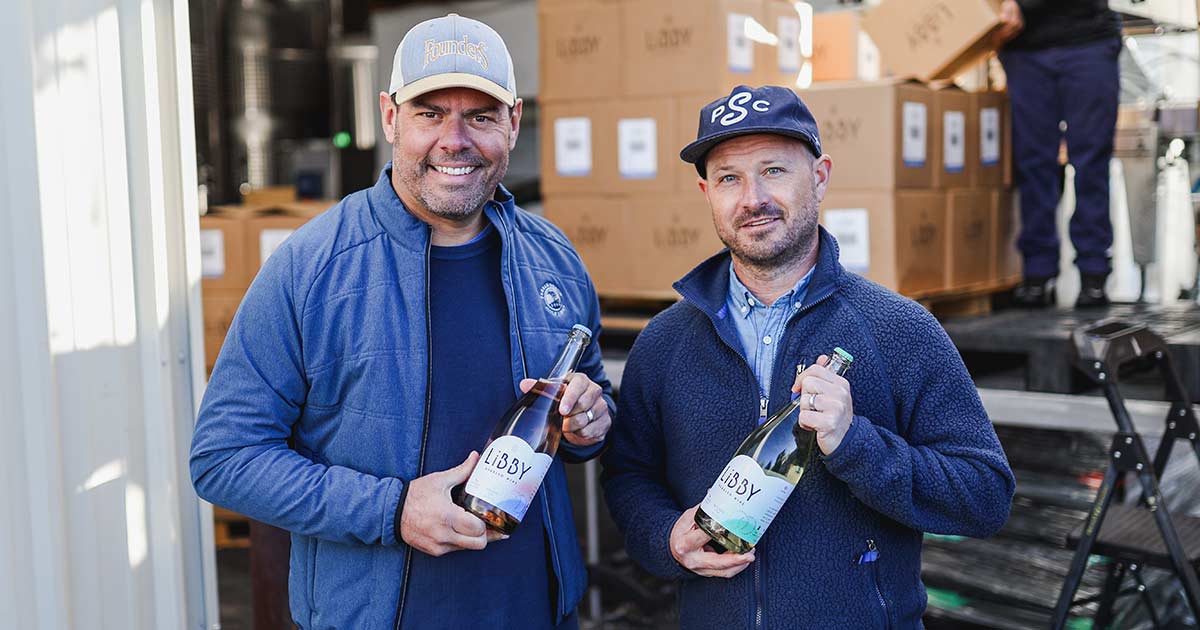A New Wine-Drinking Experience
The Origin Story of Libby Wines

Last Updated: By TRUiC Team
The wine industry is centuries old and, if we’re being honest, retains a sort of mystique that some would say borders on elitist. One could be forgiven for thinking that only the rich and powerful can truly appreciate a fine wine.
Grant Hemmingway and John Green, co-founders of Libby Wines, want to make the beverage more accessible and attractive to different types of people. They developed Libby Wines to offer an entirely new wine-drinking experience to consumers who seek drinks that “embrace authenticity, transparency, inclusivity, and wellness.” This is Libby Wines’ origin story.
A ‘Beverage Nerd’ and a Brewer
Grant, who hails from Napa, California, describes himself as a “beverage nerd, through and through.” He has worked in the beverage industry for his entire career, which has encompassed everything from production to management to growing grapes.
John was the executive chairman of Founders Brewing Company in Grand Rapids, Michigan. He was also an “investor advisor” to various alcoholic beverage companies. Joining Libby “was just such a great opportunity to partner with Grant in the wine space and tie in a number of the learnings from some of the other businesses that have been involved with,” he says.
Grant and John met through mutual friends and say they had “an instantaneous synergy, both personally and from a business mindset.” They quickly put that synergy to use.
“We spent nearly two years informally whiteboarding disruptive ideas in the beverage space before we arrived at a category we felt was ripe for disruption and optimization: sparkling wine,” they say. Libby “was the byproduct of our desire to create a wine that was delicious, session-able, pure, and natural, but could also serve as a lifestyle foundation to modernize the wine industry.”
By “session-able,” Grant and John essentially mean that you can enjoy the product without drinking yourself under the table.
“I've always felt like there was an opportunity to do something that's refreshing, tastes great, [but is] lower alcohol, lower calorie,” he says. “Since then, we've found that we're not alone in our thinking, that there are a lot of people out there – many much younger than me – who do care about what they put in their body, and they want to feel good the next day.”
Making Wine Less Exclusive
In addition, the founders want to demystify the wine industry and make it seem less intimidating and exclusive. In turn, they hope their product will appeal to a different market than a traditional wine brand typically goes after.
“What we also saw for Libby, which is where we see the brand heading, is a lifestyle play,” Grant says. “The wine category has been traditional, it's been elitist, it's been very exclusive, and that… dramatically needs to change, because the metrics for the wine industry aren't the greatest in terms of inviting new customers in, and younger consumers are electing to go elsewhere.”
In other words, although the wine industry is centuries old, its longevity isn’t guaranteed. “If we want to have centuries more to go, we need to wisen up, and we need to start listening to our consumers,” he says. “And so John and I really rallied behind that…. Libby is striving to modernize, disrupt, and bring forth a better narrative and a better product to the consumer.”
New Packaging, ‘Libby U’
Grant says the company has been listening to customer feedback and plans to start selling its wine in kegs.
“Because of the nature of Libby being forced-carbonated, we [plan to introduce] a really cool innovation, which is sparkling wine in a keg,” he says. “Traditional wine kegs are fairly nascent. Obviously, there's massive sustainability benefits to the format of stainless steel over glass. But we're just excited to bring sparkling wine to new occasions and new environments, because that's one of our driving goals at Libby.”
Libby customers also have said they don't know what to do with partially empty bottles – a particular problem for carbonated beverages, which go flat quickly. The company plans to introduce a “format innovation” to fix this problem, Grant says, without going into specifics.
He also says his team is passionate about making the wine-drinking experience more inclusive and less intimidating. “One of the ways that we feel like we can start to change that is through education. How do we make people feel less intimidated by the wine category? We've got to arm them with more knowledge.”
This is the purpose of Libby U, a marketing campaign that will include 10 scholarships for wine novices. These individuals will attend courses that will help them “feel more confident and more knowledgeable about the category so that when you're looking at the menu when you're in the wine aisle, you're not feeling that level of intimidation,” Grant says. Libby will prioritize individuals from underrepresented communities who “seem to be the most afflicted by this issue.”
Focus is Key
John says his number-one piece of advice for aspiring entrepreneurs is to focus, focus, focus.
“Oftentimes I've seen where somebody might have a really good product or service team, but they continue to go off in different directions,” he says. “Your time is one of your most valuable resources. You have a limited amount of time, so you really need to be smart in how you apply that time. You may have a project idea… or a product idea that leads to new product innovations, new packaging formats. And it's important to be disciplined and say no. You gotta understand every time you add a different product or a different package, there's a significant cost to that as well.”





